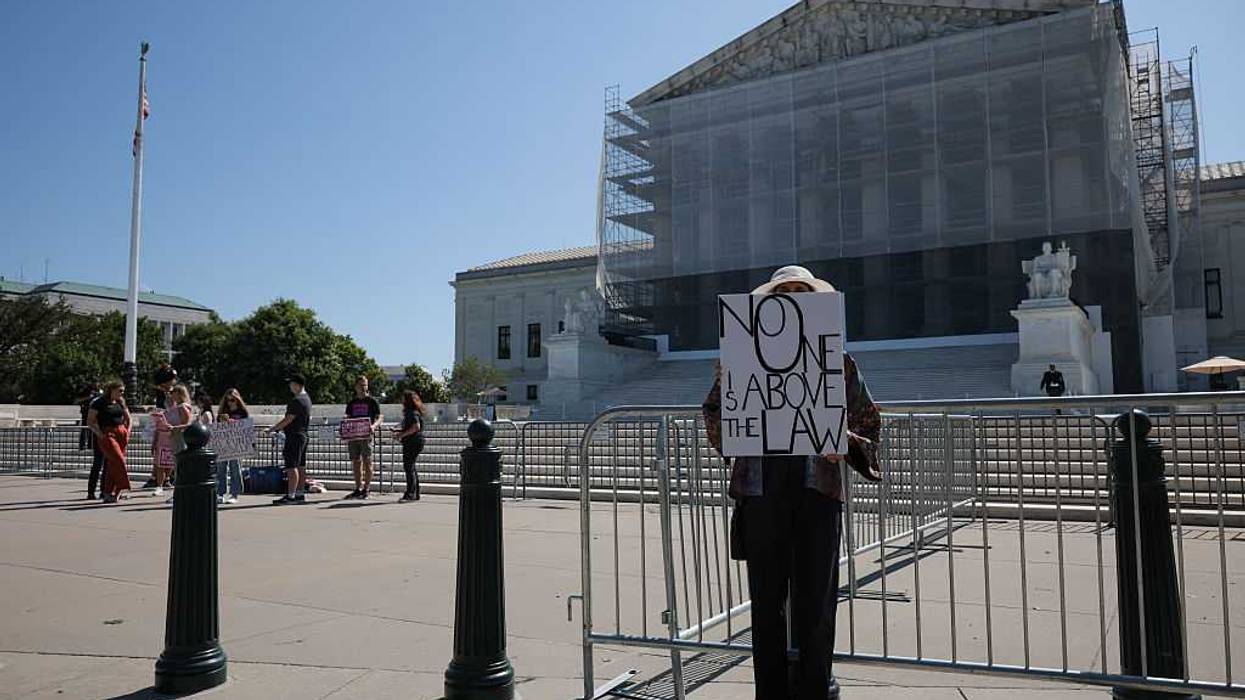"Each of us left the department, either voluntarily or involuntarily, because of actions taken by this administration," they continued. "It is incumbent on all of us to fight for the Justice Department before it's too late."
The letter, first reported by MSNBC, calls out the DOJ for carrying out President Donald Trump's "retribution campaign," spreading lies about the "deep state," violating court orders, and inappropriately dismissing employees, including at the Federal Bureau of Investigation and attorneys in the Civil Rights Division.
"The administration is taking a sledgehammer to other long-standing work the department has done to protect communities and the rule of law, too," the letter notes, citing attacks on the Tax Division, the Public Integrity Section, FBI public corruption squads, and hundreds of millions of dollars in grants for at-risk communities.
"As for its treatment of its employees, the current leadership's behavior has been appalling," the letter adds. "Demonizing, firing, demoting, involuntarily transferring, and directing employees to violate their ethical duties has already caused an exodus of over 5,000 of us."
The letter urges DOJ leadership to "adhere to the legal guardrails and institutional norms," Congress to "exercise its oversight responsibilities far more vigorously," and fellow alumni and all Americans to speak out. It concludes that "our democracy is only as strong as the rule of law, and the rule of law can't survive without the principal institution that enforces it."
In a statement, Stacey Young, executive director and founder of Justice Connection, echoed that warning: "For decades, the guiding tenet for those working at the department was to do the right thing, in the right way, for the right reasons. Many believe that's no longer possible."
"They're being asked to put loyalty to the president over the Constitution, the rule of law, and their professional ethical obligations," she added. "We're seeing the erosion of the Justice Department's fabric and integrity at an alarming pace. Our democratic system cannot survive without the primary institution that enforces the law."
Bondi and other DOJ leaders—particularly FBI Director Kash Patel—have faced mounting criticism throughout the second Trump administration, including for the attorney general's Day One memo arguing that department employees are expected to "zealously defend" the president's interests and policies.
"The abuse of the Justice Department under Bondi's watch has been rampant, including the recent high-profile and scandalous move to secure an indictment against former FBI Director Jim Comey after the president publicly demanded they do so, and despite the previous prosecutor’s claims of insufficient evidence," Public Citizen co-president Lisa Gilbert said in a Tuesday statement.
"The DOJ has been in constant turmoil since Bondi took the helm, firing prosecutors who worked Capitol riot cases or investigated Trump and pushing out senior officials at the FBI," she continued. "At the same time, under her leadership, the Public Integrity Section of the DOJ, the section dedicated to fighting corruption from federal officials, has been reduced from a total of 36 employees to two."
"The Department of Justice is intended to be independent from the White House, not its revenge arm," Gilbert stressed. "Her tenure shows they have become exactly that."
Accountable.US executive director Tony Carrk also issued a statement ahead of the Senate hearing. He said that "in her eight months as Attorney General, Pam Bondi has confirmed all warnings about her treating the office as an enforcer for Donald Trump's personal whims while also acting as a walking conflict of interest for her former lobbying firm and clients."
"It says it all that the former Qatar lobbyist Bondi penned a DOJ memo—i.e. corruption 'get out of jail free card'—allowing Donald Trump to use a gifted luxury super jet from the nation he's doing billions of dollars in crypto business with during and after his presidency," he continued.
"During her first Senate hearing," he wondered, "will Bondi answer for all these sweetheart deals she's supporting for the president and former lobbying clients while millions of working Americans are asked to choose between a continued government shutdown or losing their healthcare?"




